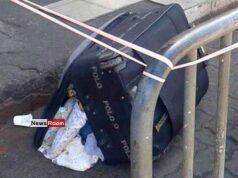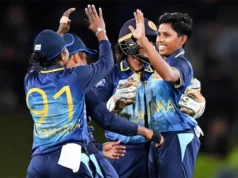Wednesday 23rd April, 2025
A four-member committee has been appointed to study the report of the Presidential Commission of Inquiry (PCoI) that probed the Easter Sunday terrorist bombings (2019). It comprises a Senior Deputy Inspector General (Chairman), the DIG of the CID, Director of the CID and the Director of the Terrorism Investigation Division. It is reported to have set up several subcommittees. Based on new evidence that may emerge, fresh investigations will be launched, the Police Media Spokesman has said.
Thus, the NPP government, too, has chosen to kick the can down the road, so to speak. All signs are that the committee and its subcommittees will take a month of Sundays to study the PCoI report, and fresh investigations to get underway on the basis of their findings and observations could go on until the cows come home.
What impact will the PCoI report have on the police investigations that have been going on into the Easter Sunday carnage for years? If the police have not already drawn on the PCoI findings and observations in probing the terror attacks, their investigations are likely to be delayed further until the conclusion of the perusal of the document.
One may recall that in August 2021, the Catholic Church demanded credible answers, within one month, to questions regarding the Easter Sunday tragedy. Its ultimatum, given in a 20-page letter, prompted the Gotabaya Rajapaksa government to have the then IGP C. D. Wickramaratne issue a special statement explaining why the probe into the Easter Sunday terror attacks had been delayed. He found fault with those who had handled the police investigations previously.
Wickramaratne’s statement, which shed light on the sorry state of affairs in the CID and other investigative branches of the police, warrants the attention of those who seek justice for the Easter Sunday carnage victims expeditiously. Wickramaratne said the police probes into the terror attacks had been riddled with flaws. Investigators had been in an inordinate hurry to make the bombings out to be the work of a handful of extremists with links to ISIS, and no serious attempt had been made to get to the bottom of the carnage, he said, claiming that they had also taken great pains to prove that all those involved in the terror attacks had been either killed or arrested. Some police officers handling investigations had acted irresponsibly, said Wickramaratne, noting that certain ego-driven investigators had tried to conclude the probes fast, and claim the credit for that; their approach had adversely impacted the criminal investigations.
The PCoI report had been referred to the Attorney General for necessary action, Wickramaratne noted, claiming that the previous investigations had been characterised by a total lack of coordination among the investigation teams, who worked in water-tight compartments. That fact had become evident from the way some incidents had been probed before the Easter Sunday bombings, IGP Wickramaratne said, pointing out that their interconnectedness had gone unnoticed.
Some other factors IGP Wickramaratne adduced to explain the delays in the police investigations in question were the process of ascertaining information from the countries where some suspects were living, and the gathering of evidence pertaining to telephone conversations from 24 June 2014 and analysing them to determine when the dissemination of extremist ideas began in this country and how extremism developed. Among those who aided and abetted the perpetrators of the Easter Sunday attacks were some educated persons and professionals, and given their calibre and social standing, investigations had to be carried out thoroughly if they were to be successfully prosecuted, Wickramaratne said, claiming that it had taken four years to bring those responsible for the bomb attack on the Dalada Maligawa in 1998 to justice, and investigations into the suicide bomb attacks on a religious ceremony held by a mosque at Akuressa in 2009 had taken seven years. The police had been able to carry out those investigations free from pressure, he said.
Cabinet Spokesman Dr. Nalinda Jayatissa has gone on record as saying that the task of disclosing the masterminds behind the Easter Sunday terror attacks should be left to the CID and the judiciary. The government, which promised to name the terror masterminds itself, has made another about-turn! With the investigative process marked by delaying tactics, inaction and deflection, it may not be unreasonable to say that at this rate, justice for the victims of Easter Sunday carnage may be galactic years away.








